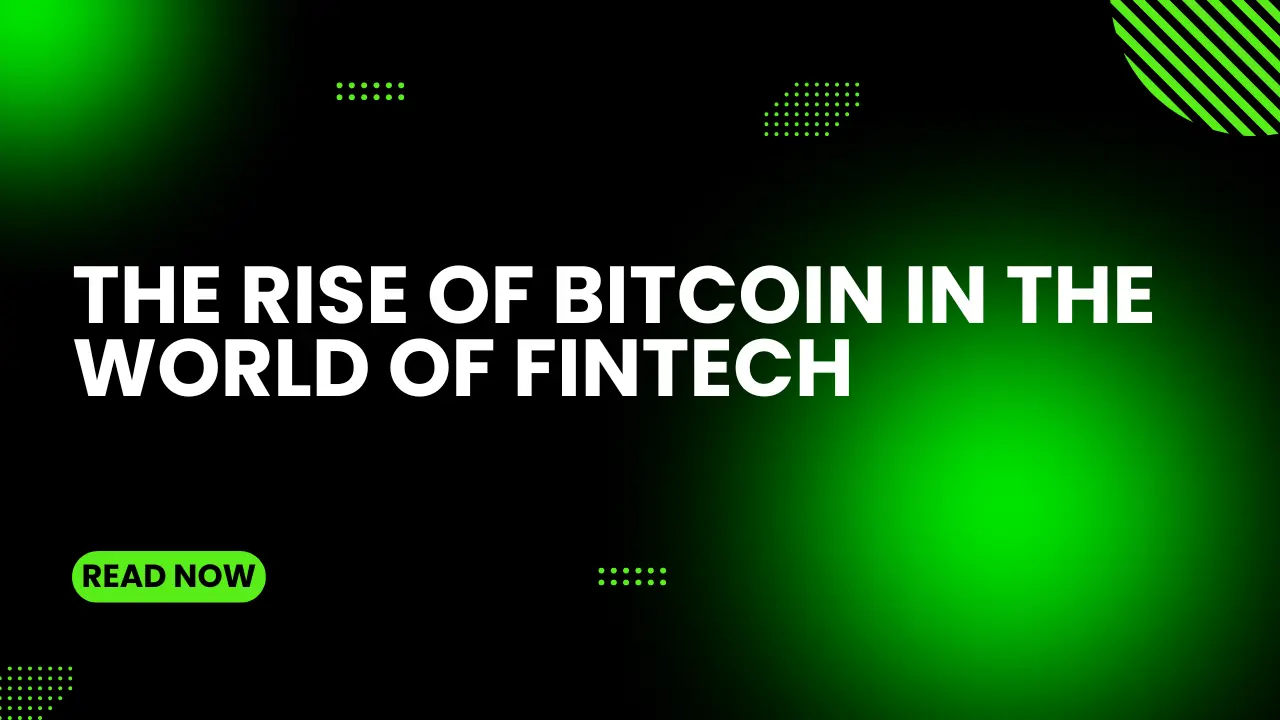The Rise of Bitcoin in the World of Fintech
In the ever-evolving landscape of finance and technology, one digital currency has emerged as a game-changer – Bitcoin. As we journey through the intricate world of fintech, it’s impossible to ignore the impact that Bitcoin has had. With its decentralized nature and peer-to-peer transactions, Bitcoin has disrupted traditional financial systems and ignited a wave of innovation. From businesses accepting Bitcoin as a form of payment to the growth of cryptocurrency exchanges, the rise of Bitcoin has been nothing short of remarkable.
In this article, we delve deep into the world of Bitcoin and explore its influence in the realm of fintech. We will investigate the driving forces behind its meteoric rise, the challenges it faces, and the potential future it holds within the financial industry. Buckle up as we navigate through the intriguing world of Bitcoin and uncover the revolution it has sparked in fintech.
Understanding the basics of Bitcoin
Bitcoin, often referred to as a cryptocurrency, is a digital form of currency that operates on a decentralized network known as the blockchain. Unlike traditional currencies that are controlled by central banks, Bitcoin is not governed by any single entity. Instead, it is created through a process called mining, where powerful computers solve complex mathematical problems to validate and record transactions on the blockchain.
One of the key features that sets Bitcoin apart from traditional currencies is its limited supply. Unlike fiat currencies that can be printed at will, Bitcoin has a maximum supply of 21 million coins. This scarcity has contributed to its value, with Bitcoin being viewed as a store of value and a potential hedge against inflation.
The rise of Bitcoin can be attributed to several factors, including its ability to provide financial freedom and security. With Bitcoin, individuals can make transactions without the need for intermediaries such as banks, reducing fees and increasing privacy. Additionally, Bitcoin transactions are secured through cryptography, making them highly secure and resistant to fraud.

The history of Bitcoin and its impact on the financial industry
Bitcoin was created in 2009 by an anonymous individual or group of individuals using the pseudonym Satoshi Nakamoto. It was introduced as an alternative to traditional banking systems, aiming to empower individuals and provide financial inclusivity.
In its early years, Bitcoin faced skepticism and was often associated with illegal activities due to its anonymity. However, as more businesses and individuals began to adopt Bitcoin, its reputation started to shift. Today, major companies such as Microsoft, Tesla, and PayPal accept Bitcoin as a form of payment, further legitimizing its use.
The impact of Bitcoin on the financial industry has been profound. It has challenged the traditional banking system by offering an alternative means of storing and transferring value. Bitcoin’s decentralized nature has also inspired the development of other cryptocurrencies and blockchain-based platforms, paving the way for a new era of financial innovation.
The advantages and disadvantages of using Bitcoin in Fintech
Using Bitcoin in fintech offers several advantages. Firstly, it provides fast and low-cost transactions, especially for cross-border payments. Traditional methods of transferring money internationally can be slow and expensive, whereas Bitcoin enables near-instantaneous transactions at a fraction of the cost.
Another advantage of Bitcoin is its transparency. All Bitcoin transactions are recorded on the blockchain, which is a public ledger accessible to anyone. This transparency allows for greater accountability, making it difficult for fraudulent activities to go unnoticed.
However, Bitcoin is not without its disadvantages. One of the main concerns surrounding Bitcoin is its volatility. The price of Bitcoin can fluctuate dramatically within a short period, making it a risky investment for some. Additionally, the decentralized nature of Bitcoin means that there is no central authority to turn to in case of fraud or loss of funds, which can be a deterrent for some users.
The role of blockchain technology in Bitcoin and Fintech
Blockchain technology is the underlying technology behind Bitcoin and has played a significant role in its rise. The blockchain is a decentralized ledger that records all Bitcoin transactions in a transparent and immutable manner.
One of the key benefits of blockchain technology is its ability to provide trust and security. By decentralizing the storage of transaction data across multiple computers, it becomes incredibly difficult for any single entity to manipulate the data or alter transactions. This makes blockchain a highly secure and reliable technology for financial transactions.
Furthermore, blockchain technology has the potential to revolutionize other areas of fintech beyond Bitcoin. It can be used to streamline processes such as identity verification, supply chain management, and smart contracts. By eliminating the need for intermediaries and reducing costs, blockchain technology has the power to transform the way we conduct financial transactions.

The future of Bitcoin in the world of Fintech
As Bitcoin continues to gain traction and acceptance, its future in the world of fintech looks promising. The increasing adoption of Bitcoin by businesses and individuals indicates a growing trust and recognition of its value.
One area where Bitcoin is expected to make significant strides is in remittances. The ability to send money across borders quickly and at a low cost makes Bitcoin an attractive option for individuals who rely on remittances as a source of income. By bypassing traditional financial institutions, Bitcoin can provide a more efficient and accessible solution for cross-border transactions.
Additionally, the ongoing development of Bitcoin infrastructure, such as cryptocurrency exchanges and wallets, is making it easier for individuals to buy, sell, and store Bitcoin. This accessibility is likely to drive further adoption and integration of Bitcoin into everyday financial transactions.
How to invest in Bitcoin and navigate the cryptocurrency market
Investing in Bitcoin can be a lucrative opportunity, but it requires careful consideration and understanding of the cryptocurrency market. Here are some key steps to consider when investing in Bitcoin:
1. Educate yourself: Before investing, take the time to learn about Bitcoin, its technology, and the factors that influence its price. Understanding the fundamentals will help you make informed investment decisions.
2. Choose a reliable exchange: Select a reputable cryptocurrency exchange to buy and sell Bitcoin. Ensure that the exchange has robust security measures in place to protect your funds.
3. Develop a strategy: Determine your investment goals and risk tolerance. Consider factors such as the amount of capital you are willing to invest, your investment timeframe, and your desired level of involvement in the market.
4. Practice risk management: Bitcoin is known for its volatility, so it’s essential to implement risk management strategies. This may include setting stop-loss orders, diversifying your portfolio, and avoiding emotional decision-making.
5. Stay informed: Keep up-to-date with the latest news and developments in the cryptocurrency market. Stay informed about regulatory changes, technological advancements, and market trends that may impact the price of Bitcoin.
Bitcoin regulations and its impact on global economies
Bitcoin’s decentralized nature has posed challenges for regulators worldwide. Governments are grappling with how to regulate and tax cryptocurrencies while balancing innovation and consumer protection.
Regulations surrounding Bitcoin vary from country to country. Some nations have embraced cryptocurrencies and created favorable regulatory environments, while others have imposed restrictions or outright bans. The lack of global regulatory consistency has created uncertainty for businesses and individuals operating in the cryptocurrency space.
The impact of Bitcoin regulations on global economies is still unfolding. While some argue that regulations can provide legitimacy and stability to the market, others fear that overly restrictive regulations may stifle innovation and hinder the growth of the cryptocurrency industry.
Striking the right balance between regulation and innovation will be crucial for governments to harness the potential benefits of Bitcoin while mitigating risks.

Bitcoin’s potential to disrupt traditional banking systems
Bitcoin has the potential to disrupt traditional banking systems in several ways. Firstly, Bitcoin’s peer-to-peer nature eliminates the need for intermediaries, such as banks, to facilitate transactions. This has the potential to reduce fees and increase the speed of transactions.
Secondly, Bitcoin’s decentralized nature empowers individuals to have full control over their funds. With Bitcoin, individuals are not reliant on traditional banking systems to store and transfer their wealth. This can provide financial inclusivity to the unbanked population and individuals in countries with unstable financial systems.
Lastly, Bitcoin’s blockchain technology can revolutionize the way financial services are provided. Smart contracts, for example, can automate processes such as lending, insurance, and asset management, reducing the need for intermediaries and increasing efficiency.
Conclusion and key takeaways
The rise of Bitcoin in the world of fintech has been nothing short of remarkable. With its decentralized nature, peer-to-peer transactions, and underlying blockchain technology, Bitcoin has disrupted traditional financial systems and ignited a wave of innovation.
While Bitcoin offers numerous advantages, such as fast and low-cost transactions, transparency, and financial freedom, it also comes with challenges. Its volatility, regulatory uncertainty, and the need for education and understanding are factors that individuals and businesses must consider when engaging with Bitcoin.
As the world continues to navigate the evolving landscape of fintech, it is clear that Bitcoin will play a pivotal role. Its potential to revolutionize financial transactions, disrupt traditional banking systems, and provide financial inclusivity makes it a force to be reckoned with.
By understanding the basics of Bitcoin, its history, advantages, challenges, and potential future, individuals and businesses can navigate the world of Bitcoin and embrace the revolution it has sparked in fintech
